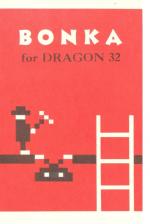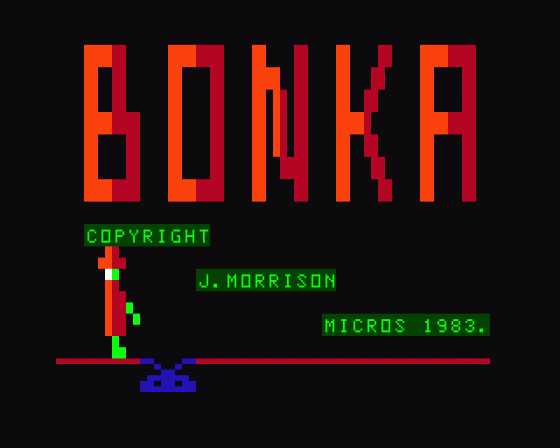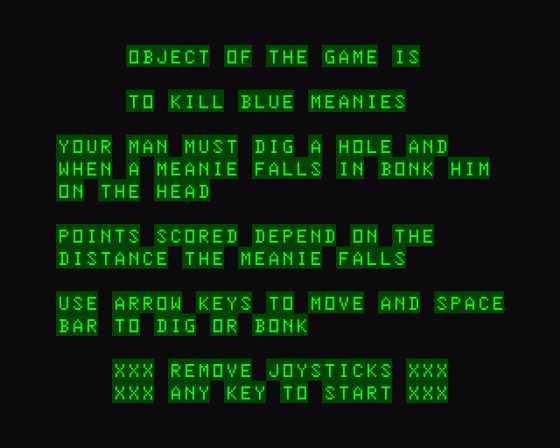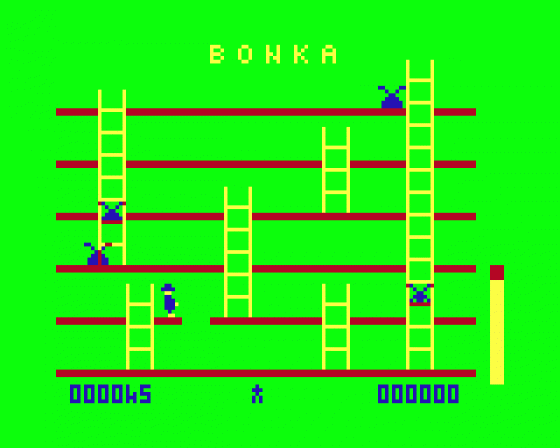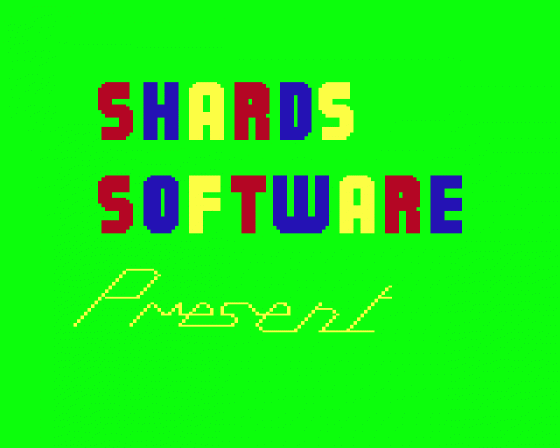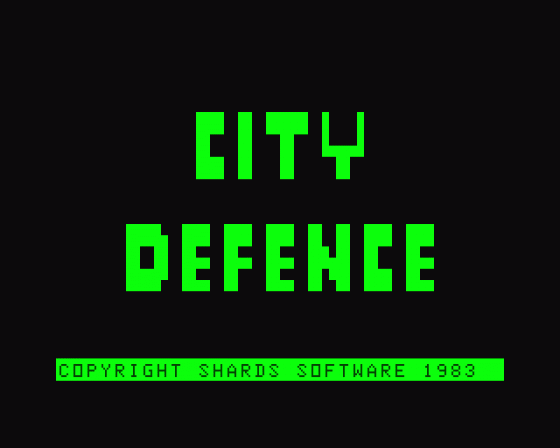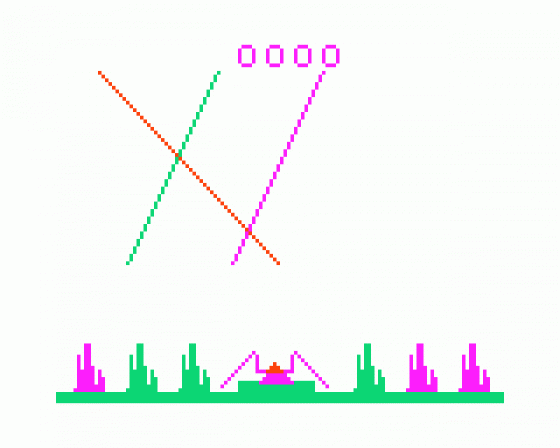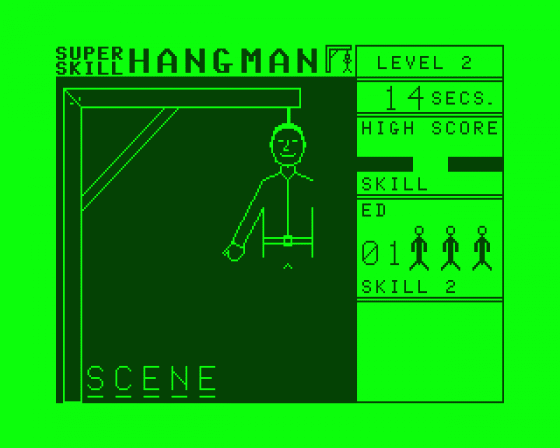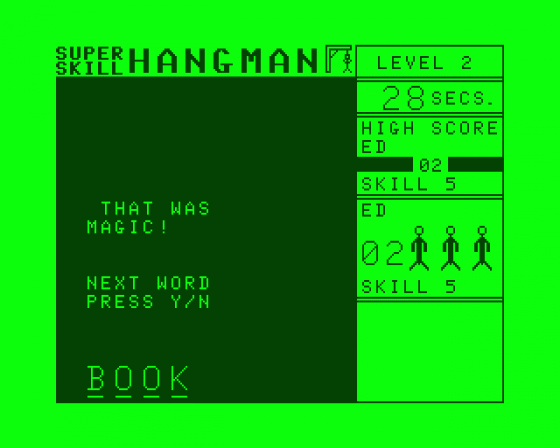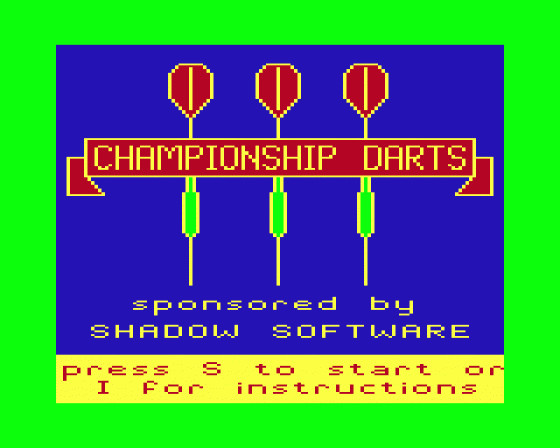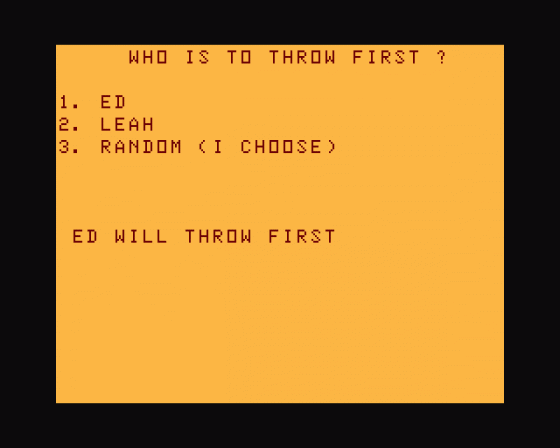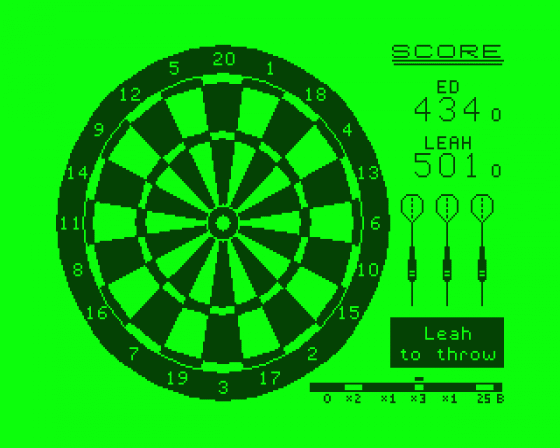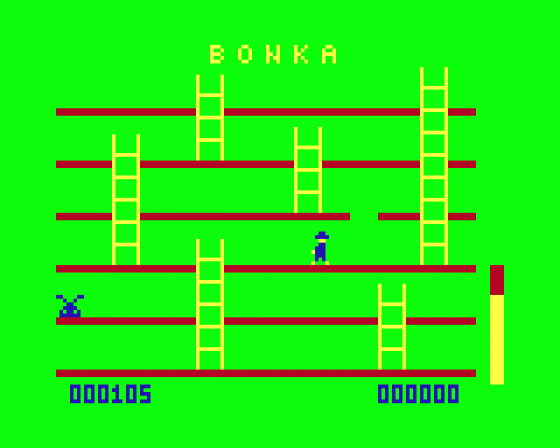
Personal Computer News
 10th June 1983
10th June 1983
Categories: Review: Software
Author: Peter Worlock
Publisher: J. Morrison Micros
Machine: Dragon 32
Published in Personal Computer News #014
Mike Gerrard pulls a handful of hot chestnuts out of the Welsh micro's lair.
Dragon Dramatics
Mike Gerrard pulls a handful of hot chestnuts out of the Welsh micro's lair
Dragons are noted for being fiery customers - even the modern microchip variety does have a certain reputation. So this week PCN takes a trip through the latest in Dragon games to see if we can find any scorchers.
Bonka
To begin with the best of the bunch, Bonka from J Morrison is a colourful machine code version of the game originating in the arcades where you control a little man (looking like a flour grader here) who runs along platforms and ladders, occasionally stopping to dig holes into which he attempts to lure the Meanies who are chasing him.
A trapped Meanie must be promptly hit on the head, and points are scored depending on how far the creature plummets to its doom.
While inevitably lacking some graphic detail, this is still superior to most games around, giving you a choice of four speeds and between one and nine Meanies, and I defy anyone to stay alive at the highest level with all nine in hot pursuit.
The only drawback is that movement is through the arrow keys, with the space bar for digging and bonking, and it takes a little time and a lot of dead men (amusing graphics here) to master the controls.
All credit to J Morrison for concentrating on a few excellent machine code games for the Dragon, though I do wish its packaging was as good as that from Salamander.
Night Flight
Night Flight, you'll be astonished to hear, is a flight simulation program, the first I've seen, and it proved to be a slight disappointment, though this may or may not have something to do with the fact that I couldn't even get the wretched plane off the ground without crashing.
It certainly wasn't the fault of the instructions, which are detailed and clear, but I expected more from the graphics than two converging white lines and a plain blue block at the top of the screen.
The lower half contains the information panel, with speed, position, heading, distance from runway and so on, while you key in alterations to your direction, power, flaps and undercarriage.
I was obviously the right person to test whether the program was idiot-proof, and it was, but for more experienced pilots the aim is to take off, fly around, perform a few rolls and loops if you can, and then land safely again. Having seen screen photos of other flight simulations though, I don't think this can be one of the best.
City Defence
Even more of a disappointment was City Defence from Shards Software, though I'm always wary of people who describe their own games in glowing terms, like this one: "A fast moving missile-command arcade game."
The arcades would soon be empty if they had only games like this Basic one, which didn't get off to the best of starts with the loading instructions being wrong. CLOAD "program name" you are told, whereas you need to CLOAD "Defence".
A minor irritation, but it doesn't inspire confidence in the rest of the product.
The game itself has you in command of a planet full of cities, with the usual hostile aliens who haven't seen E.T. hell-belt on everyone's destruction.
Three traces start to move down the screen, and you must guide your sights to the tips of these traces with your joystick (no keyboard option). There are four speed levels, and while it does make good use of the Dragon's colour and sound, the game would seem to have little long-lasting appeal... or even short-lasting appeal, and is scarcely better than some from magazine listings.
Super Skill Hangman
From Salamander comes a very good version of the old favourite, Hangman, and while it's not a game I would play for too long myself, I can imagine young children getting a lot of fun from it, and that's the market at which it's aimed.
Features include a vocabulary of 1,000 words, three levels of difficulty, one or two player options, and the choice of using a timer as well. Words and pictures are all on the high-res black and green screen, new words take only about five seconds to appear, and there's also an automatic skill adjustment if hangings are too frequent or too few.
Family Programs
An improvement on City Defence, and from the same company (Shards), is Family Programs, a collection of eleven varied items, the best being a Name That Tune type of quiz, with over 100 songs in memory - great fun, and very tricky to do - with tunes being played at unusual tempos.
Also good is a Maths quiz in high-res graphics, with three levels of difficulty and an egg-timer running out at the top of the screen.
Other programs include a version of Simon, a slow-tank battle, a quiz on various topics, a mortgage and savings calculator, and one or two odds and ends which seem to be there just to make up the numbers.
Championship Darts
All darts players know that you finish on a double, so I'll finish with Championship Darts, a game for two players. Games like chess transfer readily to the micro, while others might be better left where they are, and darts would appear to be one of the latter.
This version, though, is not an attempt at exact simulation but more an adaptation within the confines of the computer, and is all the better for that. As a regular darts player myself I enjoyed it, even if the only improvement it will make to your game at the pub is by encouraging you to work out those finishing scores that much quicker.
Using the high-resolution black and green screen, the writer is to be congratulated on his impressive use of graphics, and for a Basic program the responses are very quick indeed.
So how does it work? A cursor moves clockwise round the board, and pressing any key will stop it on the number you want... well, you hope it will. Another cursor then moves back and forth across a bar, broken up into sections for single, double, treble, miss, 25 or bull, and again you must try and stop it on the one that you're after.
The game length can be anything from two to 999, and scoring the magical 180 earns you a multi-coloured flashing lights routine... and it's about as easy to get as it is in the real game.
Not an addictive game, perhaps, but certainly one I'd return to from time to time for a bit of fun, and done to a very high standard. Second only to Bonka in this little batch.
Other Reviews Of Bonka For The Dragon 32
And This Review Be Your Guide...
John Scriven hits the adventure trail - with some stops along the way for arcade games
Bonka (J. Morrison Micros)
A review

